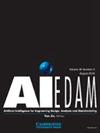以数据为灵感的博物馆和画廊游客体验协同设计
IF 2.3
3区 工程技术
Q3 COMPUTER SCIENCE, ARTIFICIAL INTELLIGENCE
Ai Edam-Artificial Intelligence for Engineering Design Analysis and Manufacturing
Pub Date : 2022-02-09
DOI:10.1017/S0890060421000317
引用次数: 1
摘要
摘要对各种数据的捕获和分析被广泛认为对数字经济中新产品和服务的设计至关重要。我们专注于利用它来激发博物馆游客体验的共同设计,这是一个独特的案例,揭示了使用个人数据的机会和挑战。我们展示了一系列受数据启发的参观体验,这些体验来自于为期三年的设计研究过程。其中包括将虚拟模型叠加在实物展品上,一款用于创建个性化旅游作为礼物的智能手机应用程序,对展品的情感反应的可视化,以及构思卡的数据驱动使用。我们在整个投资组合中进行反思,以阐明数据通过使用模糊性、可视化和个性化来启发设计的多种方式;数据如何通过共同构思、共同创造和共同解释的过程来激励共同设计;以及它的使用必须如何应对隐私、所有权和透明度方面的挑战。通过采用人类对数据的看法,我们能够绘制出复杂而丰富的信息,这些信息可以为设计活动提供信息,并为推动创造力支持系统的数据集做出贡献。本文章由计算机程序翻译,如有差异,请以英文原文为准。
Data-inspired co-design for museum and gallery visitor experiences
Abstract The capture and analysis of diverse data is widely recognized as being vital to the design of new products and services across the digital economy. We focus on its use to inspire the co-design of visitor experiences in museums as a distinctive case that reveals opportunities and challenges for the use of personal data. We present a portfolio of data-inspired visiting experiences that emerged from a 3-year Research Through Design process. These include the overlay of virtual models on physical exhibits, a smartphone app for creating personalized tours as gifts, visualizations of emotional responses to exhibits, and the data-driven use of ideation cards. We reflect across our portfolio to articulate the diverse ways in which data can inspire design through the use of ambiguity, visualization, and inter-personalization; how data inspire co-design through the process of co-ideation, co-creation, and co-interpretation; and how its use must negotiate the challenges of privacy, ownership, and transparency. By adopting a human perspective on data, we are able to chart out the complex and rich information that can inform design activities and contribute to datasets that can drive creativity support systems.
求助全文
通过发布文献求助,成功后即可免费获取论文全文。
去求助
来源期刊
CiteScore
4.40
自引率
14.30%
发文量
27
审稿时长
>12 weeks
期刊介绍:
The journal publishes original articles about significant AI theory and applications based on the most up-to-date research in all branches and phases of engineering. Suitable topics include: analysis and evaluation; selection; configuration and design; manufacturing and assembly; and concurrent engineering. Specifically, the journal is interested in the use of AI in planning, design, analysis, simulation, qualitative reasoning, spatial reasoning and graphics, manufacturing, assembly, process planning, scheduling, numerical analysis, optimization, distributed systems, multi-agent applications, cooperation, cognitive modeling, learning and creativity. AI EDAM is also interested in original, major applications of state-of-the-art knowledge-based techniques to important engineering problems.

 求助内容:
求助内容: 应助结果提醒方式:
应助结果提醒方式:


